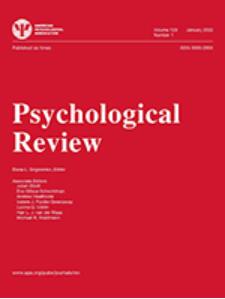概率定义概念的简单性和复杂性。
IF 5.8
1区 心理学
Q1 PSYCHOLOGY
引用次数: 0
摘要
众所周知,人类的概念学习受到概念复杂性的影响:简单的概念更容易学习,而更复杂的概念则更难学习。然而,简单性偏差的研究几乎完全是在布尔特征上定义的确定性概念的背景下进行的,而在连续特征上定义的概率概念的更一般情况下则相对较少。本文报道了一系列实验,在这些实验中,受试者被要求学习在一个新的二维连续特征空间上定义的概率概念。每个概念都是几个不同高斯分量的混合,在保持分量数量不变的情况下,通过操纵混合分量相对于彼此的位置,可以改变概念的复杂性。结果证实,混合成分的定位强烈影响学习,独立于概念的内在统计可分性,这是独立操作。此外,结果指出了量化概率概念复杂性的信息论基础框架,以压缩复杂性的概念为中心:简单的概念是那些可以从概念的投影到较低维特征空间中近似恢复的概念,而更复杂的概念是那些只能通过组合特征来表示的概念。该框架为概率概念的复杂性提供了一致的、连贯的和广泛适用的度量。(PsycInfo Database Record (c) 2025 APA,版权所有)。本文章由计算机程序翻译,如有差异,请以英文原文为准。
Simplicity and complexity of probabilistically defined concepts.
Human concept learning is known to be impaired by conceptual complexity: Simpler concepts are easier to learn, and more complex ones are more difficult. However, the simplicity bias has been studied almost exclusively in the context of deterministic concepts defined over Boolean features and is comparatively unexplored in the more general case of probabilistic concepts defined over continuous features. This article reports a series of experiments in which subjects were asked to learn probabilistic concepts defined over a novel 2D continuous feature space. Each concept was a mixture of several distinct Gaussian components, and the complexity of the concepts was varied by manipulating the positions of the mixture components relative to each other while holding the number of components constant. The results confirm that the positioning of mixture components strongly impacts learning, independent of the intrinsic statistical separability of the concepts, which was manipulated independently. Moreover, the results point to an information-theoretic basis framework for quantifying the complexity of probabilistic concepts, centered on the notion of compressive complexity: Simple concepts are those that can be approximately recovered from a projection of the concept onto a lower dimensional feature space, while more complex concepts are those that can only be represented by combining features. The framework provides a consistent, coherent, and broadly applicable measure of the complexity of probabilistic concepts. (PsycInfo Database Record (c) 2025 APA, all rights reserved).
求助全文
通过发布文献求助,成功后即可免费获取论文全文。
去求助
来源期刊

Psychological review
医学-心理学
CiteScore
9.70
自引率
5.60%
发文量
97
期刊介绍:
Psychological Review publishes articles that make important theoretical contributions to any area of scientific psychology, including systematic evaluation of alternative theories.
 求助内容:
求助内容: 应助结果提醒方式:
应助结果提醒方式:


